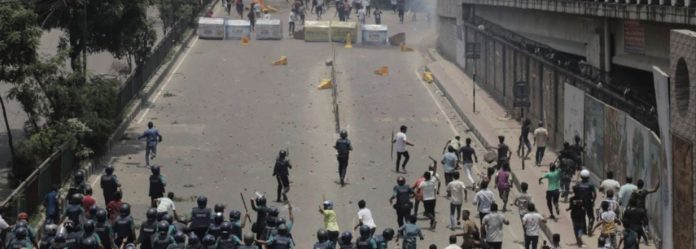Dhaka, July 29: In view of the ongoing students unrest against the government job quota system in Bangladesh, which has claimed more than 200 innocent lives, the Students community of Bangladesh has issued an appeal to the world to support their demands. A gist of their appeal is hereunder:
For years, Bangladeshi students have staged protests demanding reforms in the government job quota system. Under the current system, 56% of government jobs are reserved for various groups, including children and grandchildren of freedom fighters, women, tribal people, and the physically challenged. The agitation began in 1997 and saw significant protests in 2007 and 2013, yet the government remained unresponsive until 2018, when nationwide protests forced Prime Minister Sheikh Hasina to abolish the quota system for first and second-class government job recruitment.
The students initially sought a reform, not the complete abolition of the quota system. However, the Prime Minister’s drastic decision fueled further unrest, as many perceived it as an overreaction and a tool for political gain by the ruling Awami League. Recently, the government attempted to reinstate the quota system through legal means, prompting a renewed peaceful student movement.
Public university students led the charge, but their calls for dialogue were met with repression. On July 14, the Prime Minister’s derogatory remarks, referring to the protesting students as “Razakar’s grandchildren” (a term for collaborators with the Pakistani army during the liberation war), incited widespread anger. This led to increased demonstrations, with slogans echoing the insult.
The situation escalated on July 15 when the government deployed the Chhatra League (the student wing of the ruling party) and other security forces, including the Police, RAB, BGB, and Ansar, to violently suppress the protests. Despite this, the movement spread to campuses nationwide, turning into a significant uprising.
The government’s brutal crackdown included firing on students, deploying helicopters to drop tear gas and sound grenades, and shutting down all educational institutions and internet connections across the country. This blackout has prevented accurate reporting of the death toll, which state-controlled media reports as at least 209, though the actual number is believed to be much higher. Hospitals are overwhelmed with wounded students, and the government forces have even obstructed medical treatment and detained injured protesters from hospitals.
Amidst this chaos, thousands of students have been detained, tortured, and some have disappeared. The government has imposed a nationwide curfew and deployed the army, with internet access still restricted as of July 27.
The student community has issued a nine-point demand:
- The Prime Minister must accept responsibility for the mass killings and publicly apologize.
- Resignations from Home Minister Asaduzzaman Khan Kamal, Road Transport and Bridges Minister Obaidul Quader, Education Minister Mohibul Hasan Chowdhury Nowfel, and Law Minister Anisul Haq.
- Dismissal of police officers involved in the violence.
- Resignations from the Vice Chancellors and Proctors of Dhaka University, Jahangirnagar University, and Rajshahi University.
- Arrest of attackers from the Chhatra League and Jubo League.
- Compensation for the families of those killed and injured.
- Banning of the Chhatra League and corrupt student politics, with the establishment of student parliaments in major universities.
- Reopening of all educational institutions and dormitories.
- Assurance against academic or administrative harassment of protesters.
Though the protesters have not explicitly demanded the government’s resignation, many believe that without it, justice for the genocide and the country’s liberation from dictatorship cannot be achieved. The appeal to the international community is clear: support the call for the resignation of the current government, justice for the student genocide, and solidarity with the Bangladeshi people’s struggle for democratic rights.




